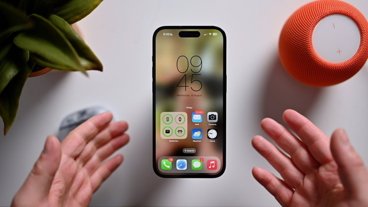Apple will begin allowing third-party developers to use its Screen Time API with the launch of iOS 15, which could mean better data access for parental control apps.
The Screen Time feature, introduced in 2018, allows users to monitor the time spent on their devices. For families, Screen Time also allows for a level of parental control with app limitations and usage tracking.
In iOS 15, Apple says developers will be able to use the Screen Time API to support more tools and controls for parents. This is a first, since there hasn't been any Screen Time APIs since its launch.
"Developers can use the Screen Time API in parental controls apps to support an even wider range of tools for parents. The API provides developers with key features like core restrictions and device activity monitoring, all in a way that puts privacy first," Apple says of the access.
The release of the Screen Time API may be a step toward mitigating antitrust scrutiny. Screen Time was central to a dispute between Apple and parental control apps in 2019. At the time, Apple began removing apps that had misused enterprise tools for monitoring, though it did so just ahead of releasing Screen Time.
In May 2019, parental control apps that had been removed from the App Store demanded that Apple release a developer-accessible API for the feature.
Follow all of WWDC 2021 with comprehensive AppleInsider coverage of the week-long event from June 7 through June 11, including details on iOS 15, iPadOS 15, watchOS 8, macOS Monterey and more.
Stay on top of all Apple news right from your HomePod. Say, "Hey, Siri, play AppleInsider," and you'll get latest AppleInsider Podcast. Or ask your HomePod mini for "AppleInsider Daily" instead and you'll hear a fast update direct from our news team. And, if you're interested in Apple-centric home automation, say "Hey, Siri, play HomeKit Insider," and you'll be listening to our newest specialized podcast in moments.
 Mike Peterson
Mike Peterson








 Thomas Sibilly
Thomas Sibilly
 Wesley Hilliard
Wesley Hilliard
 Marko Zivkovic
Marko Zivkovic

 Malcolm Owen
Malcolm Owen

 Amber Neely
Amber Neely

-xl-m.jpg)








2 Comments
I got a call and had to step out during the API presentation, was this featured? I haven’t gone back to watch it.
This seems like this could be important in antitrust discussions, as an example of how OS development really works. Reliable APIs don’t just magically appear overnight. It takes multiple releases over several years to develop something like this, especially given the complexities of development for a range of devices, from iOS to macOS. For sure, Apple could have handled it better, but that doesn’t change the reality of the situation.
I think this is great. I agree that it can only help with antitrust concerns but more importantly, as long as it doesn’t create any security issues, opening up as many APIs as possible to 3rd parties simply encourages more software development and makes devices more useful.